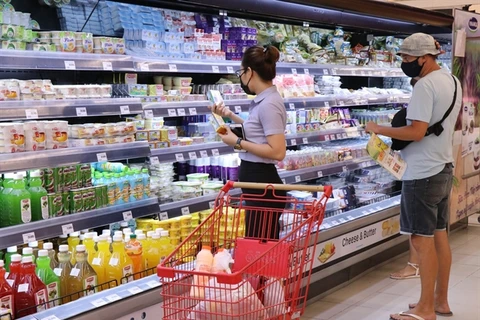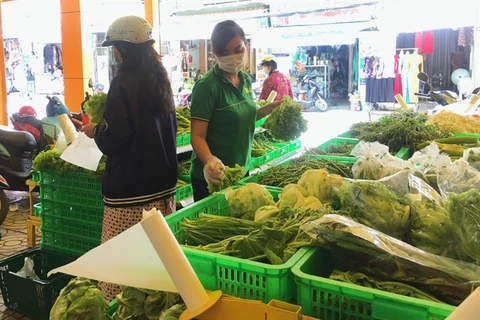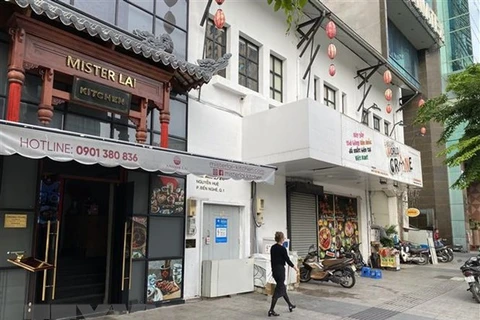HCM City (VNS/VNA) – Localities in the Mekong Delta have coordinated with relevant agencies and businesses to ensure the COVID-19 outbreak does not disrupt the supply of essential goods or causes price hikes, and plan to carry out food safety inspections to ensure people can shop safely.
According to authorities, amid the epidemic, ensuring the supply of goods is the top priority.
The industry and trade departments in the region have called on all production units, distribution systems and retailers to make plans to stockpile essential goods, especially price-stabilised items, to ensure supply does not dry up.
Nguyen Van Tham, deputy director of Hau Giang province’s Department of Industry and Trade, said his department has coordinated with districts, towns and cities, businesses, supermarkets, and department stores across the province to stockpile rice, pork, chicken, eggs, seafood, vegetables, instant noodles, salt, cooking oil, bottled water, antibacterial cloth masks, antiseptic liquid, and toilet paper.
In case of an emergency, authorities would use specialised vehicles to distribute essential goods to people in quarantine, he added.
In Can Tho city, 11 businesses have registered to stockpile food and foodstuffs worth a total of over 553 billion VND (23.97 million USD), especially rice, meat, seafood, vegetables, fruits, instant noodles, bottled water, processed foods, and eggs.
Some others have registered to stock other products such as masks, antiseptic liquids, toilet paper, and petrol.
The Can Tho municipal Department of Industry and Trade has coordinated with relevant agencies and departments to set up three teams to inspect traditional markets, supermarkets and businesses to ensure they comply with anti-COVID measures.
It also plans to stock essential goods to meet demand under all circumstances.
Similarly, the Dong Thap Department of Industry and Trade has instructed commercial centres, supermarkets, traditional markets, and businesses in the province to carry out an assessment of the risk posed by COVID and report plans to ensure supply of essential goods.
Businesses in the region have proactively made goods production and supply plans, and distributors are actively working with suppliers to stock a variety of goods.
Nguyen Kim Cuong, deputy director of Co.opmart Can Tho, said the volume of stocks is worth around 18 billion VND (781,476 USD).
It has stepped up sales via telephone and app to make it easier for customers.
Like other Co.opmart supermarkets across the country, it has ensured sufficient stocks of goods at the best prices, she said, adding that it could provide 1,000-1,500 hot meals a day.
Van Quoc Hoang, director of Co.opmart in Vinh Long pProvince, said currently his supermarket focuses on increasing stocks of essential items that people could store for long-term use such as canned foods, rice, spices, frozen goods, spring rolls, meat paste, milk, vegetables, fresh meat, and fish.
According to industry and trade departments in south-western provinces, along with stockpiling of goods, authorities also continue to exhort people to stay calm assuring them that the supply of essential goods is always abundant.
They also warn people not to hoard essential items, especially inflammable and explosive items such as gasoline and oil.
Ho Chi Minh City has also vowed to ensure market stable.
According to their managements, the volume of goods arriving remains normal at around 3,300 tonnes per night at the Thu Duc Wholesale Market and 4,160 tonnes at the Hoc Mon Wholesale Market in the city.
Retailers such as Saigon Co.op, Central Retail, Lotte Mart, and AEON Mall have stocked enough goods to ensure adequate supply and continue to take measures to safeguard the health of customers and staff amid the rising community incidence of COVID-19.
For instance, Saigon Co.op’s retail systems, including Co.opmart, Co.opXtra, Co.op Food, and Co.op Smile, have increased stocks of basic necessities such as sugar, rice, cooking oil, salt, fish sauce, meat, poultry eggs, and dry foods besides hand sanitisers, soaps and anti-bacterial cloth masks to ensure steady supply and prices for at least the next six months.
At all stores, customers are required to wear face masks, get their temperature checked and maintain social distance while shopping and waiting to pay.
Nguyen Anh Duc, general director of Saigon Co-op, said this time anti-epidemic measures have been stepped up because the outbreak is more threatening this time.
The supermarkets’ two key tasks now are to ensure food security and a safe shopping environment for people, he said.
Saigon Co.op and other retailers are working with suppliers of essential goods to offer discounts by turn on products to share the burden with consumers and minimise the increase in prices./.
VNA























